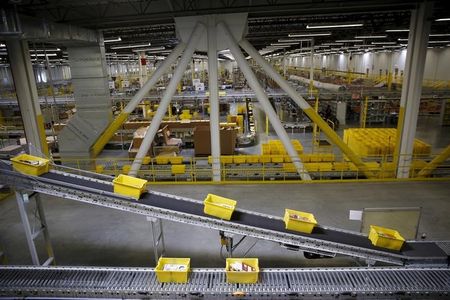
By Gabriel Araujo
SAO PAULO (Reuters) – Private equity-backed reforestation startup Re.Green has partnered with Agro Penido to restore 600 hectares (1,482 acres) of land owned by a Brazilian agribusiness firm with native species from the Amazon (NASDAQ: Signed on It said on Monday.
Their partnership is the latest deal for the nascent forestry business in Brazil, home to the world’s largest rainforest and this year’s host of the COP30 UN climate summit in the Amazon city of Belem.
Local startups including re.green, AXA-backed Mombak and Biomass – a firm founded by Susano, Santander (BME: ), Vale, Marfrig, Rabobank and Itau – work to buy land or partner with local farmers to restore areas. are doing the amazon
Converting degraded land to forests can generate carbon credits, which companies buy off their greenhouse gas emissions voluntarily or through regulated markets like Brazil recently wrote into law.
Firms such as Alphabet (NASDAQ: ) unit Google, Microsoft (NASDAQ: ), Facebook (NASDAQ: ) owner Meta and McLaren Racing have recently purchased carbon credits from Brazilian projects.
Chief Executive Thiago Piccolo told Reuters that the new Re.Green deal marks the first time it is partnering to restore land owned by farmers, noting that the firm has already bought 26,000 hectares from ranchers. .
“Land buying is an important model, but we always knew that to get to re-greening size we had to partner with landowners and get them into the business,” Piccolo said.
Re.Green is backed by Brazilian billionaire Joao Moreira Salles and asset managers including Lanx Capital, Principia, Dynamo and Gavea Investimentos, which was founded by former Brazilian central bank governor Arminio Fraga.
Both Salles and Fraga are on the board of Re.Green, which aims to restore 1 million hectares of land in Brazil, an area twice the size of Delaware. It announced a deal with Microsoft in May to restore 15,000 hectares in the Amazon.
The deal with Agro Penido covers areas near the Xingu Indigenous Park in Mato Grosso, Brazil’s largest grain-producing state. Re.Green plans to reforest less productive parts of Agro Penido’s farms, some of which could produce wood in addition to carbon credits, Piccolo said.
Piccolo said the first phase of their partnership has the potential to generate about 300,000 carbon credits over the next few decades, each representing the equivalent of removing one metric ton of carbon dioxide from the atmosphere.
He said re.green could sell its forestry-based credits at a premium, fetching $50 to $100 in private deals.
Scientists believe protecting the Amazon is critical to preventing climate change because its trees absorb large amounts of climate-warming carbon dioxide. Some critics complain that offsets allow polluters to avoid reducing their emissions.
Agro Penido, which has a separate joint venture with grain powerhouse SLC Agricola, currently has about 40,000 hectares producing soybeans, maize and cotton, with a target to increase to 65,000 hectares by 2027/28.
“This is a start,” Caio Penido, an owner, said of the re.green deal. He added that they will now evaluate other areas owned by the firm, noting that it is possible for the project to double its scope to 1,200 hectares. (This story has been corrected to fix the area from 13,000 hectares to 26,000 hectares in paragraph 6)










